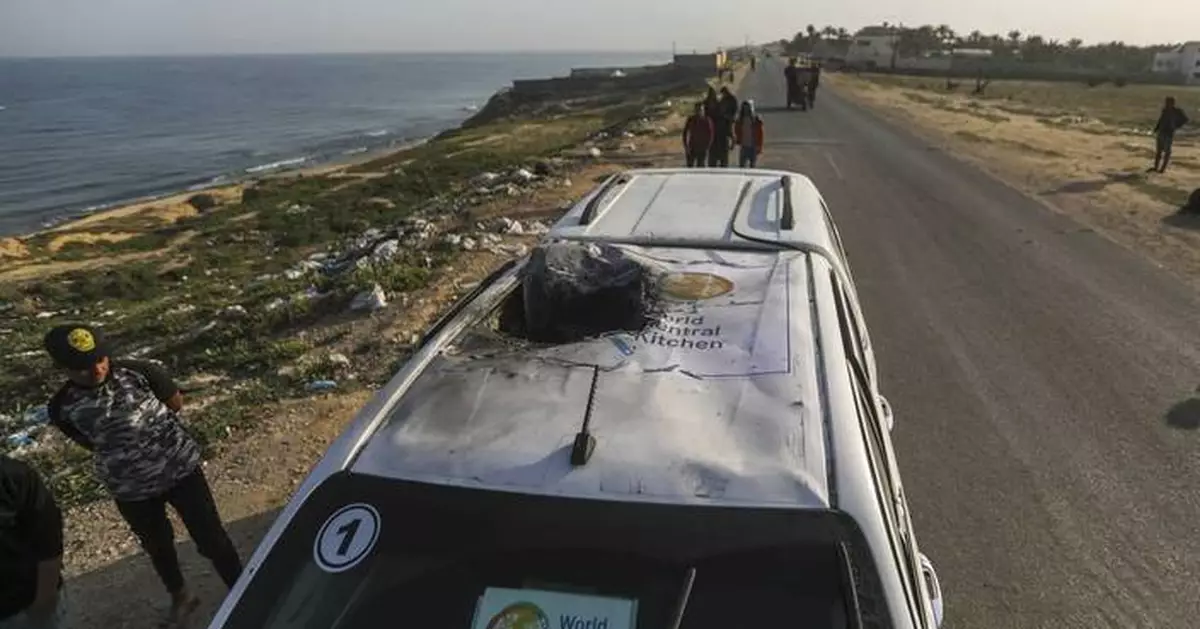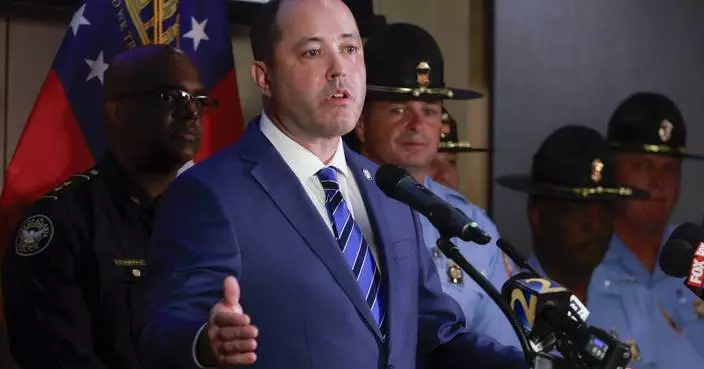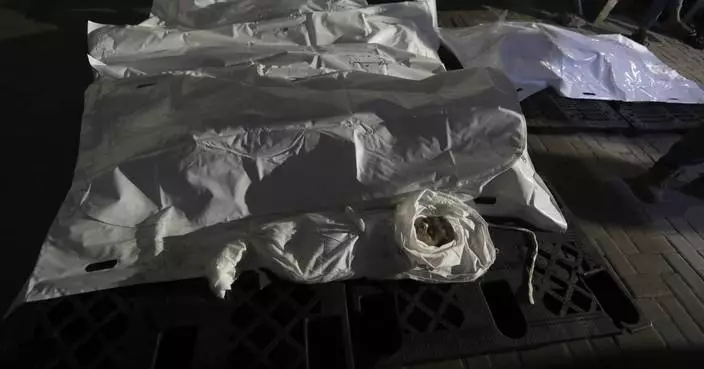DEIR AL BALAH, Gaza Strip (AP) — It was hours after sundown when the eight aid trucks drove from the makeshift jetty, cobbled together from tons of wreckage left across Gaza by months of war.
The trucks were escorted by three vehicles carrying aid workers from the World Central Kitchen, the relief organization that had arranged the massive food shipment. All seven aid workers wore body armor. The cars were marked, including on the roof, with the group’s emblem, a multicolored frying pan.
Click to Gallery
FILE - Friends and residents gather to place candles and flowers in honor of Damian Soból, a Polish food aid worker who was killed with six other World Central Kitchen workers by Israeli airstrike in Gaza this week, in Soból's hometown of Przemysl, in southeastern Poland, on Thursday, April 4, 2024. World Central Kitchen and a few other aid groups suspended operations in Gaza, after seven aid workers were killed by airstrikes. Yet despite the danger, many of the largest organizations barely slowed down. Hunger has become commonplace in Gaza amid the war with Israel, and U.N. officials warn that famine is increasingly likely in northern Gaza. (AP Photo, File)
FILE - Friends and residents gather to place candles and flowers in honor of Damian Soból, a Polish food aid worker who was killed with six other World Central Kirchen workers by Israeli airstrike in Gaza this week, in Soból's hometown of Przemysl, in southeastern Poland, on Thursday, April 4, 2024. World Central Kitchen and a few other aid groups suspended operations in Gaza, after seven aid workers were killed by airstrikes. Yet despite the danger, many of the largest organizations barely slowed down. Hunger has become commonplace in Gaza amid the war with Israel, and U.N. officials warn that famine is increasingly likely in northern Gaza. (AP Photo, File)
DEIR AL BALAH, Gaza Strip (AP) — It was hours after sundown when the eight aid trucks drove from the makeshift jetty, cobbled together from tons of wreckage left across Gaza by months of war.
FILE - Friends and residents gather to place candles and flowers in honor of Damian Soból, a Polish food aid worker who was killed with six other World Central Kitchen workers by Israeli airstrike in Gaza this week, in Soból's hometown of Przemysl, in southeastern Poland, on Thursday, April 4, 2024. World Central Kitchen and a few other aid groups suspended operations in Gaza, after seven aid workers were killed by airstrikes. Yet despite the danger, many of the largest organizations barely slowed down. Hunger has become commonplace in Gaza amid the war with Israel, and U.N. officials warn that famine is increasingly likely in northern Gaza. (AP Photo, File)
FILE - Friends and residents gather to place candles and flowers in honor of Damian Soból, a Polish food aid worker who was killed with six other World Central Kirchen workers by Israeli airstrike in Gaza this week, in Soból's hometown of Przemysl, in southeastern Poland, on Thursday, April 4, 2024. World Central Kitchen and a few other aid groups suspended operations in Gaza, after seven aid workers were killed by airstrikes. Yet despite the danger, many of the largest organizations barely slowed down. Hunger has become commonplace in Gaza amid the war with Israel, and U.N. officials warn that famine is increasingly likely in northern Gaza. (AP Photo, File)
FILE - An ambulance carrying bodies of the foreign humanitarian aid workers killed in a recent Israeli airstrike in Gaza crosses the Rafah border crossing between Egypt and the Gaza Strip, Wednesday, April 3, 2024. World Central Kitchen and a few other aid groups suspended operations in Gaza, after seven aid workers were killed by airstrikes. Yet despite the danger, many of the largest organizations barely slowed down. Hunger has become commonplace in Gaza amid the war with Israel, and U.N. officials warn that famine is increasingly likely in northern Gaza. (AP Photo/Ahmed Abudraa, File)
FILE - Members of the World Central Kitchen aid group, transports the body of one of the six foreign aid workers who were killed in an Israeli strike, at a hospital morgue in Rafah, Wednesday, April 3, 2024. World Central Kitchen and a few other aid groups suspended operations in Gaza, after seven aid workers were killed by airstrikes. Yet despite the danger, many of the largest organizations barely slowed down. Hunger has become commonplace in Gaza amid the war with Israel, and U.N. officials warn that famine is increasingly likely in northern Gaza. (AP Photo/Fatima Shbair, File)
FILE - Members of the World Central Kitchen aid group, transports the body of one of the six foreign aid workers who were killed in an Israeli strike, at a hospital morgue in Rafah, Wednesday, April 3, 2024. World Central Kitchen and a few other aid groups suspended operations in Gaza, after seven aid workers were killed by airstrikes. Yet despite the danger, many of the largest organizations barely slowed down. Hunger has become commonplace in Gaza amid the war with Israel, and U.N. officials warn that famine is increasingly likely in northern Gaza. (AP Photo/Fatima Shbair, File)
FILE - A man displays blood-stained British, Polish, and Australian passports after an Israeli airstrike, in Deir al-Balah, Gaza Strip, World Central Kitchen and a few other aid groups suspended operations in Gaza, after seven aid workers were killed by airstrikes. Yet despite the danger, many of the largest organizations barely slowed down. Hunger has become commonplace in Gaza amid the war with Israel, and U.N. officials warn that famine is increasingly likely in northern Gaza. (AP Photo/Abdel Kareem Hana, File)
FILE - People inspect the site where World Central Kitchen workers were killed in Deir al-Balah, Gaza Strip, April 2, 2024. World Central Kitchen and a few other aid groups suspended operations in Gaza, after seven aid workers were killed by airstrikes. Yet despite the danger, many of the largest organizations barely slowed down. Hunger has become commonplace in Gaza amid the war with Israel, and U.N. officials warn that famine is increasingly likely in northern Gaza. (AP Photo/Abdel Kareem Hana, File)
FILE - Palestinians inspect a vehicle with the logo of the World Central Kitchen wrecked by an Israeli airstrike in Deir al Balah, Gaza Strip, Tuesday, April 2, 2024. World Central Kitchen and a few other aid groups suspended operations in Gaza, after seven aid workers were killed by airstrikes. Yet despite the danger, many of the largest organizations barely slowed down. Hunger has become commonplace in Gaza amid the war with Israel, and U.N. officials warn that famine is increasingly likely in northern Gaza. (AP Photo/Ismael Abu Dayyah, File)
After a grueling crawl along a beaten-up road, it seemed like mission accomplished. The convoy dropped off its precious cargo at a warehouse, and the team prepared to head home.
There wasn’t much more than a sliver of moon that night. The roads were dark, except for occasional patches where light spilled from buildings with their own generators.
By a few minutes after 10 p.m., the convoy was moving south on Al Rashid Street, Gaza’s coastal road.
The first missile struck a little more than an hour later.
Soon after, all seven aid workers were dead.
The path to the April 1 attack started months ago, as aid groups desperately looked for ways to feed millions cut off from regular food deliveries. Gaza was sealed off by Israeli forces within hours of the Oct. 7 attack by Hamas militants that ignited the war. Since then, more than 33,000 Palestinians have been killed and more than 80% of the enclave’s 2.3 million people displaced.
Hunger has become commonplace. Famine, U.N. officials warn, has become increasingly likely in war-ravaged northern Gaza.
With the situation growing increasingly dire and deliveries through Gaza's land crossings with Israel and Egypt limited, World Central Kitchen pioneered an effort to deliver aid by sea.
The relief group, founded in 2010 by celebrity chef José Andrés, has worked from Haiti to Ukraine, dispatching teams that can quickly provide meals on a mass scale in conflict zones and after natural disasters. The group prides itself on providing food that fits with local tastes.
Its first ship arrived in mid-March, delivering 200 tons of food, water and other aid in coordination with Israel.
On March 30, three ships and a barge left Cyprus carrying enough rice, pasta, flour, canned vegetables, and other supplies to prepare more than 1 million meals, the group said.
Two days later, some of those supplies were ready to be trucked into the heart of Gaza.
The eight-truck World Central Kitchen convoy turned south after leaving the pier, driving along the coast toward a warehouse about 10 kilometers (6.2 miles) away.
The World Central Kitchen team traveled in two armored cars and a third unarmored vehicle. They included a Palestinian driver and translator, Saifeddin Issam Ayad Abutaha, a young businessman whose mother was hoping to find him a wife; and security consultant Jacob Flickinger, a dual American-Canadian citizen saving to build a house in Costa Rica where he and his girlfriend could raise their 18-month-old son.
There were three British military veterans, an Australian beloved for her big hugs and relentless work ethic, and a Polish volunteer heralded by the group as “builder, plumber, welder, electrician, engineer, boss, confidant, friend, and teammate.”
The team had established a “deconfliction” plan ahead of time with Israeli forces, so the military would know when they would travel and what route they would take.
Aid organizations use complex systems to try to keep their teams safe. Typically, they send an advance plan to COGAT, the Israeli defense agency responsible for Palestinian civilian matters, which then shares it with the Israeli army, said a military official. As deliveries unfold, the aid groups can communicate with the military in real time, said the official, speaking on condition of anonymity in line with army briefing rules.
Workers for World Food Kitchen carry GPS transmitters that track their locations, according to an organization employee who spoke on condition of anonymity because he didn't have permission to talk to the media.
Many relief workers have expressed concerns about the deconfliction system.
“It hasn’t been working well,” said Chris Skopec, a Washington-based official with the aid group Project Hope, citing poor communication and coordination. “And when it doesn’t work well, people die.”
Things began to go wrong a few miles from the pier.
An Israeli officer, watching from a drone, saw what he thought was a Hamas gunman climb on top of one truck and fire into the air.
Gunmen are a daily part of life in Gaza, which has been run by Hamas since 2007. They could be Hamas fighters, members of Hamas-supervised police or privately employed guards.
Some relief groups hire armed guards, aid officials said, often plain-clothed men who brandish guns or large sticks to beat back hungry Palestinians trying to snatch supplies.
The World Central Kitchen sometimes uses armed guards, the employee said, though it was not clear if they had been employed for the April 1 convoy. The employee and other aid officials insisted their guards were not part of Hamas or its militant ally, Palestinian Islamic Jihad, but did not elaborate on the guards' affiliation. Despite such denials, it is unlikely anyone riding on top of an aid truck wouldn't have at least tacit permission from Hamas.
Israeli military spokesperson Maj. Nir Dinar said soldiers try to distinguish between armed security guards and Hamas militants when determining targets. He said he could not rule out the possibility that the armed men accompanying the World Central Kitchen convoy were security guards.
In grainy aerial footage that the Israeli military showed to journalists, people swarmed around the convoy when it arrived at a World Central Kitchen warehouse in the city of Deir Al-Balah. The military said two to four of the men were armed, though that was not clear in the aerial footage shown to journalists.
The trucks remained at the warehouse but the three World Central Kitchen vehicles began driving south to take the workers to their accommodations. Another vehicle that had joined the convoy – which the Israelis say held gunmen – drove north toward another warehouse.
Planning messages sent by World Central Kitchen had made clear that the aid workers would not remain with the trucks but would travel on by car.
But Israeli officials say the soldiers monitoring the convoy had not read the messages. Then, an Israeli officer believed he saw someone step into a World Central Kitchen vehicle with a gun.
“The state of mind at that time was the humanitarian mission had ended and that they were tracking Hamas vehicles with at least one suspected gunman,” said retired Gen. Yoav Har-Evan, who led the military's investigation into the strike.
Because of the darkness, Israeli officials said the World Central Kitchen emblems on the cars’ roofs were not visible.
The first missile struck one of the armored cars as it drove along the coastal road. Aid workers fled the damaged vehicle for the other armored car, which Israel struck two minutes later.
The survivors piled into the third vehicle. It, too, was soon hit.
Abdel Razzaq Abutaha, the brother of the slain driver, said other aid workers called him after the blasts, telling him to check on his brother.
He repeatedly called his brother’s phone. Eventually a man answered, and said he’d found the phone around 200 meters (656 feet) from one of the bombed-out cars.
“Everyone in the car was killed,” the man told Abdel Razzaq.
Abdel Razzaq had believed his brother's work would be safe.
“It is an American international institution with top coordination,” he said. “What is there to fear?”
When the sun rose the next morning, the burned husks of the three vehicles were spread along a mile or so of Al Rashid Street.
Israel quickly admitted it had mistakenly killed the aid workers, and launched an investigation.
“It’s a tragedy,” military spokesman Rear Adm. Daniel Hagari told reporters. “It shouldn’t have happened. And we will make sure that it won’t happen again.”
On Friday, Israel said it had dismissed two officers and reprimanded three more for their roles, saying they had mishandled critical information and violated the army’s rules of engagement, which require multiple reasons to identify a target.
In the wake of the deadly strike, Israel and COGAT have set up a special “war room” where COGAT and military officials sit together to streamline the coordination process.
Israel’s promises have done little to quiet growing international anger over its offensive.
More than 200 aid workers have been killed in Gaza since the war began, including at least 30 killed in the line of duty, according to the U.N. Many aid workers noted the convoy strike stood out only because six of those killed were not Palestinian.
Aid workers are, in many ways, a hard community to define. Some are experts who earn a good living traveling from disaster to disaster. Some are volunteers looking for a way to do some good. Some are driven by ambition, others by faith.
In Gaza, though, everyone understood the risks.
John Flickinger’s son Jacob, a Canadian military veteran, was a member of the convoy’s security team.
“He volunteered to go into Gaza, and he was pretty clear-eyed,” Flickinger told the AP. “We discussed it, that it was a chaotic situation.”
While World Central Kitchen and a few other aid groups suspended operations in Gaza after the attacks, many of the largest organizations, including Doctors Without Borders and Oxfam International, barely slowed down.
The convoy strike “wasn’t outside of things that we could have predicted, unfortunately,” said Ruth James, a UK-based Oxfam regional humanitarian coordinator. Except for one cancelled trip, Oxfam staff simply kept working.
“What keeps them going?” she asked. “I can only guess.”
Jeffery and Frankel reported from Jerusalem. Associated Press writers Tim Sullivan contributed from Minneapolis; James Pollard from New York; and Stephany Matat from West Palm Beach, Florida.
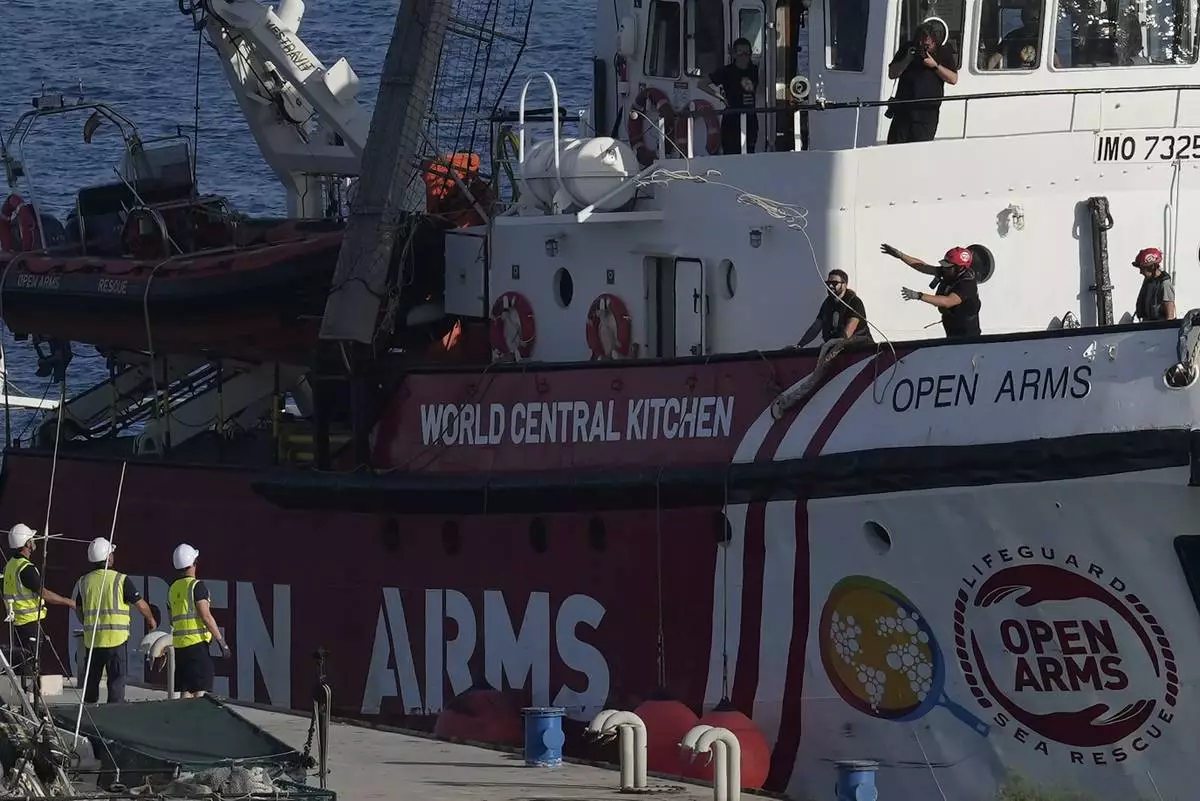
FILE - A ship belonging to the Open Arms aid group and is one of three ships loaded with canned food destined to Gaza, has returned to the Cypriot port of Larnaca, Cyprus, Wednesday, April 3, 2024. World Central Kitchen and a few other aid groups suspended operations in Gaza, after seven aid workers were killed by airstrikes. Yet despite the danger, many of the largest organizations barely slowed down. Hunger has become commonplace in Gaza amid the war with Israel, and U.N. officials warn that famine is increasingly likely in northern Gaza. (AP Photo/Petros Karadjias, File)
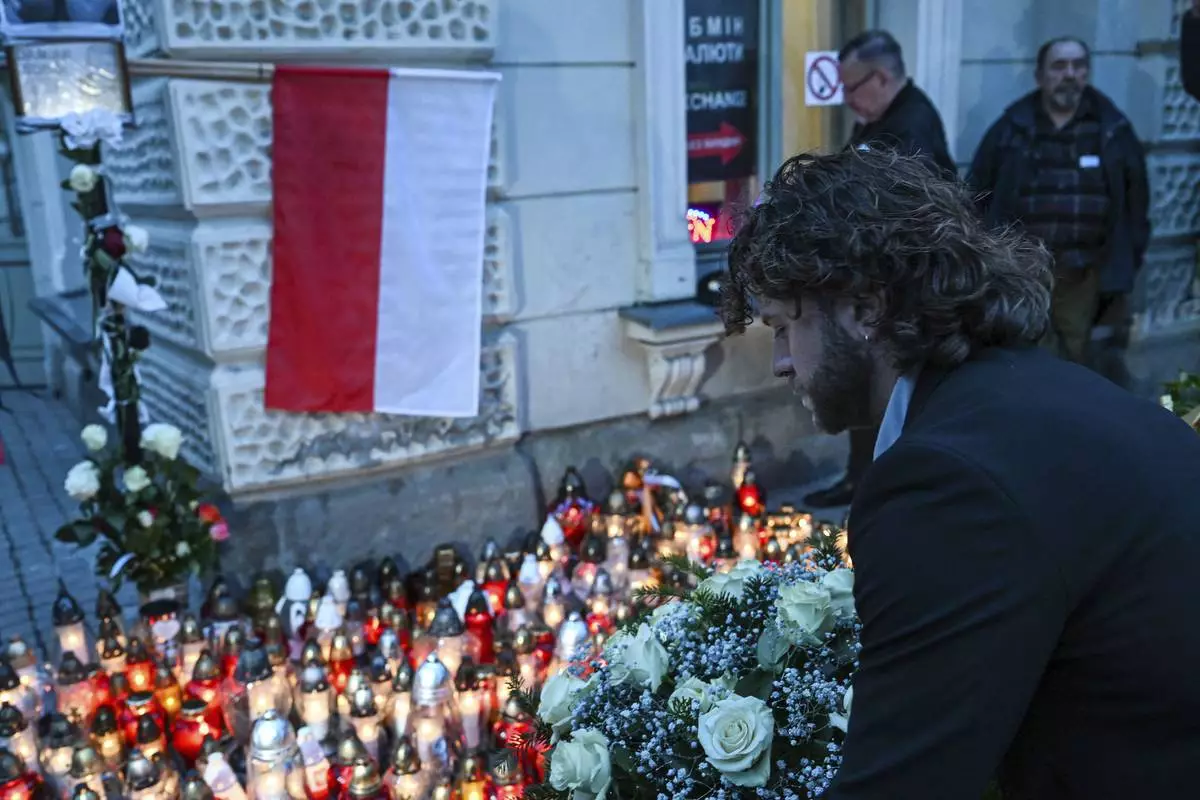
FILE - Friends and residents gather to place candles and flowers in honor of Damian Soból, a Polish food aid worker who was killed with six other World Central Kitchen workers by Israeli airstrike in Gaza this week, in Soból's hometown of Przemysl, in southeastern Poland, on Thursday, April 4, 2024. World Central Kitchen and a few other aid groups suspended operations in Gaza, after seven aid workers were killed by airstrikes. Yet despite the danger, many of the largest organizations barely slowed down. Hunger has become commonplace in Gaza amid the war with Israel, and U.N. officials warn that famine is increasingly likely in northern Gaza. (AP Photo, File)
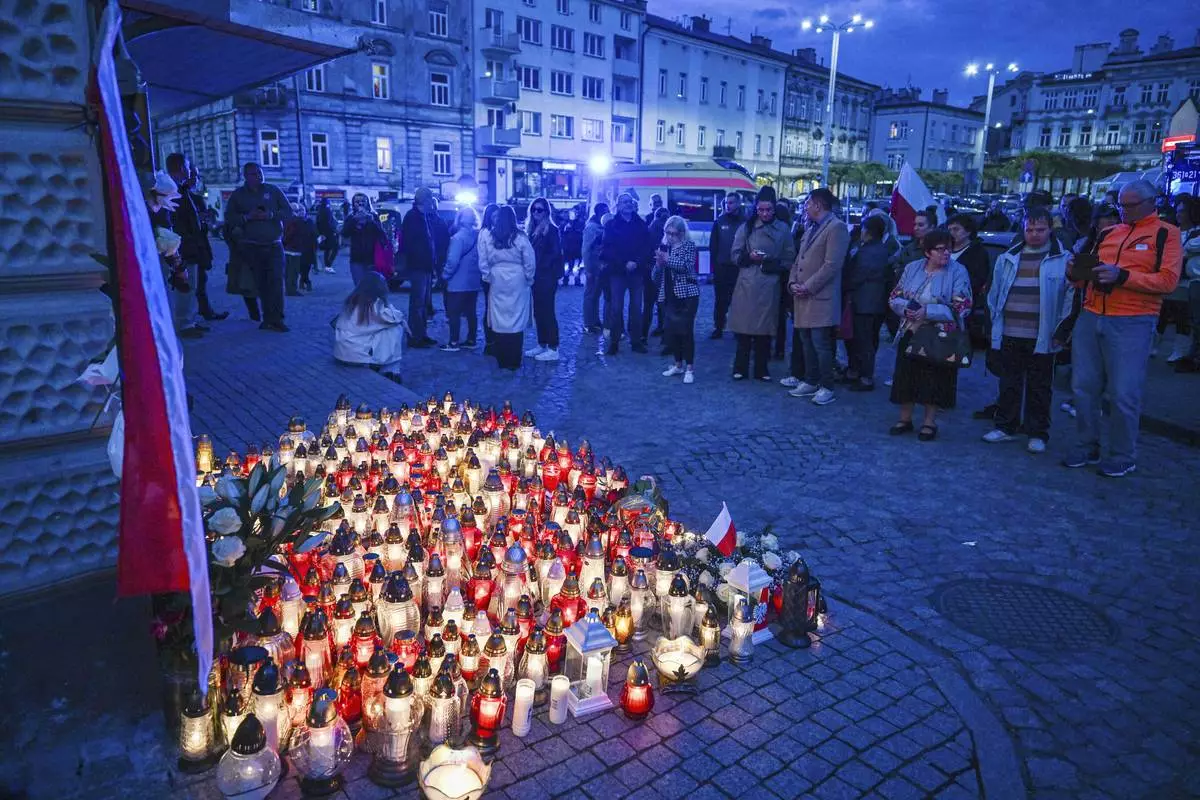
FILE - Friends and residents gather to place candles and flowers in honor of Damian Soból, a Polish food aid worker who was killed with six other World Central Kirchen workers by Israeli airstrike in Gaza this week, in Soból's hometown of Przemysl, in southeastern Poland, on Thursday, April 4, 2024. World Central Kitchen and a few other aid groups suspended operations in Gaza, after seven aid workers were killed by airstrikes. Yet despite the danger, many of the largest organizations barely slowed down. Hunger has become commonplace in Gaza amid the war with Israel, and U.N. officials warn that famine is increasingly likely in northern Gaza. (AP Photo, File)
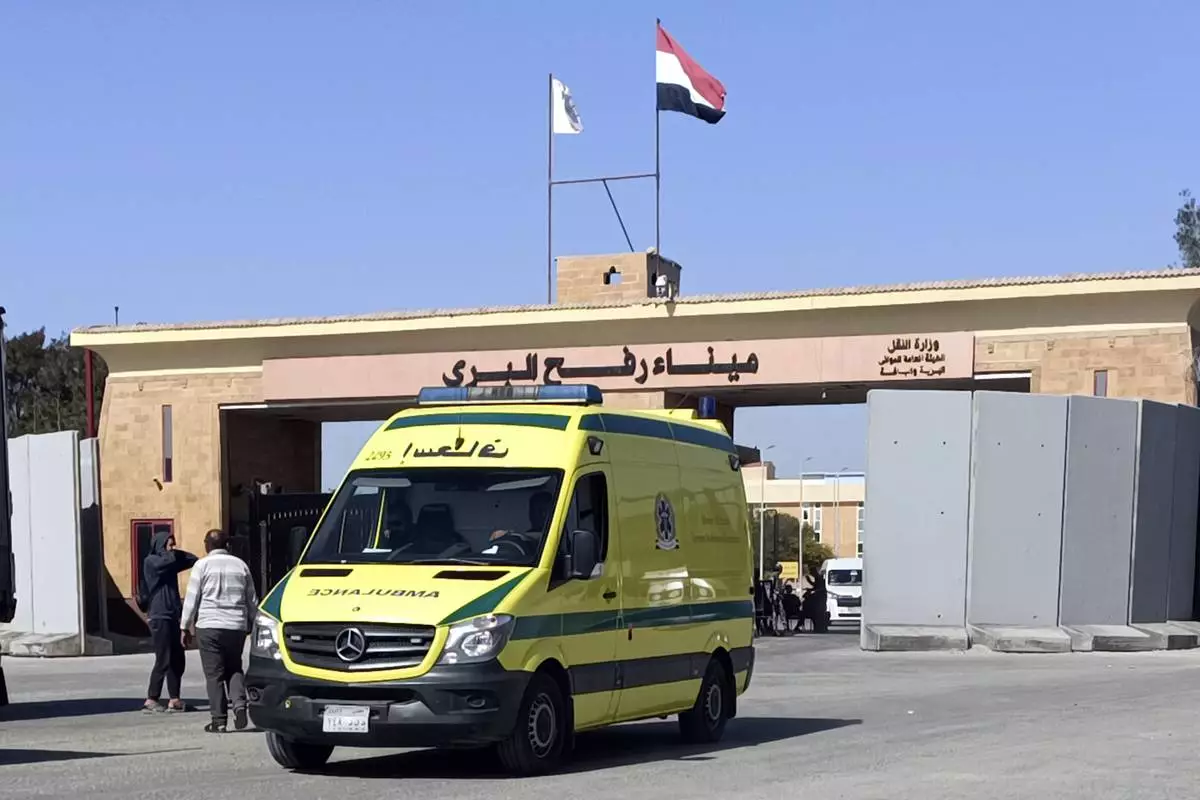
FILE - An ambulance carrying bodies of the foreign humanitarian aid workers killed in a recent Israeli airstrike in Gaza crosses the Rafah border crossing between Egypt and the Gaza Strip, Wednesday, April 3, 2024. World Central Kitchen and a few other aid groups suspended operations in Gaza, after seven aid workers were killed by airstrikes. Yet despite the danger, many of the largest organizations barely slowed down. Hunger has become commonplace in Gaza amid the war with Israel, and U.N. officials warn that famine is increasingly likely in northern Gaza. (AP Photo/Ahmed Abudraa, File)
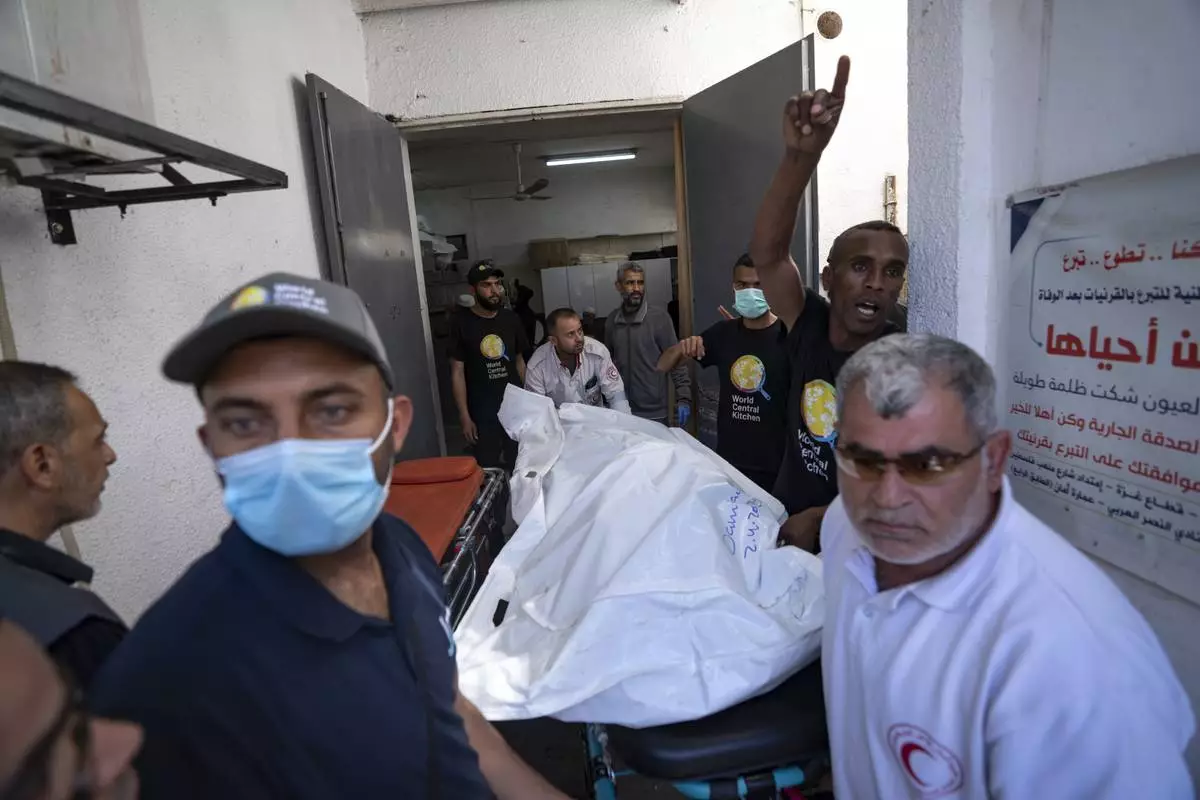
FILE - Members of the World Central Kitchen aid group, transports the body of one of the six foreign aid workers who were killed in an Israeli strike, at a hospital morgue in Rafah, Wednesday, April 3, 2024. World Central Kitchen and a few other aid groups suspended operations in Gaza, after seven aid workers were killed by airstrikes. Yet despite the danger, many of the largest organizations barely slowed down. Hunger has become commonplace in Gaza amid the war with Israel, and U.N. officials warn that famine is increasingly likely in northern Gaza. (AP Photo/Fatima Shbair, File)
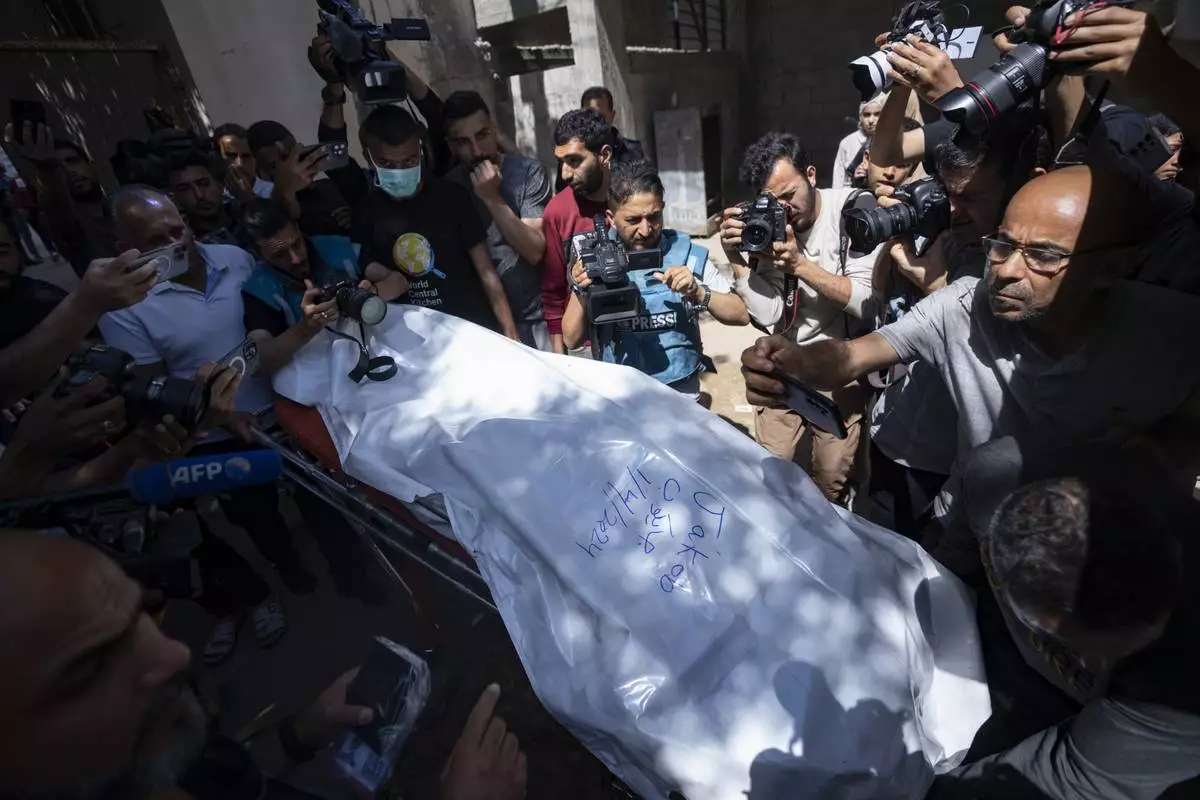
FILE - Members of the World Central Kitchen aid group, transports the body of one of the six foreign aid workers who were killed in an Israeli strike, at a hospital morgue in Rafah, Wednesday, April 3, 2024. World Central Kitchen and a few other aid groups suspended operations in Gaza, after seven aid workers were killed by airstrikes. Yet despite the danger, many of the largest organizations barely slowed down. Hunger has become commonplace in Gaza amid the war with Israel, and U.N. officials warn that famine is increasingly likely in northern Gaza. (AP Photo/Fatima Shbair, File)
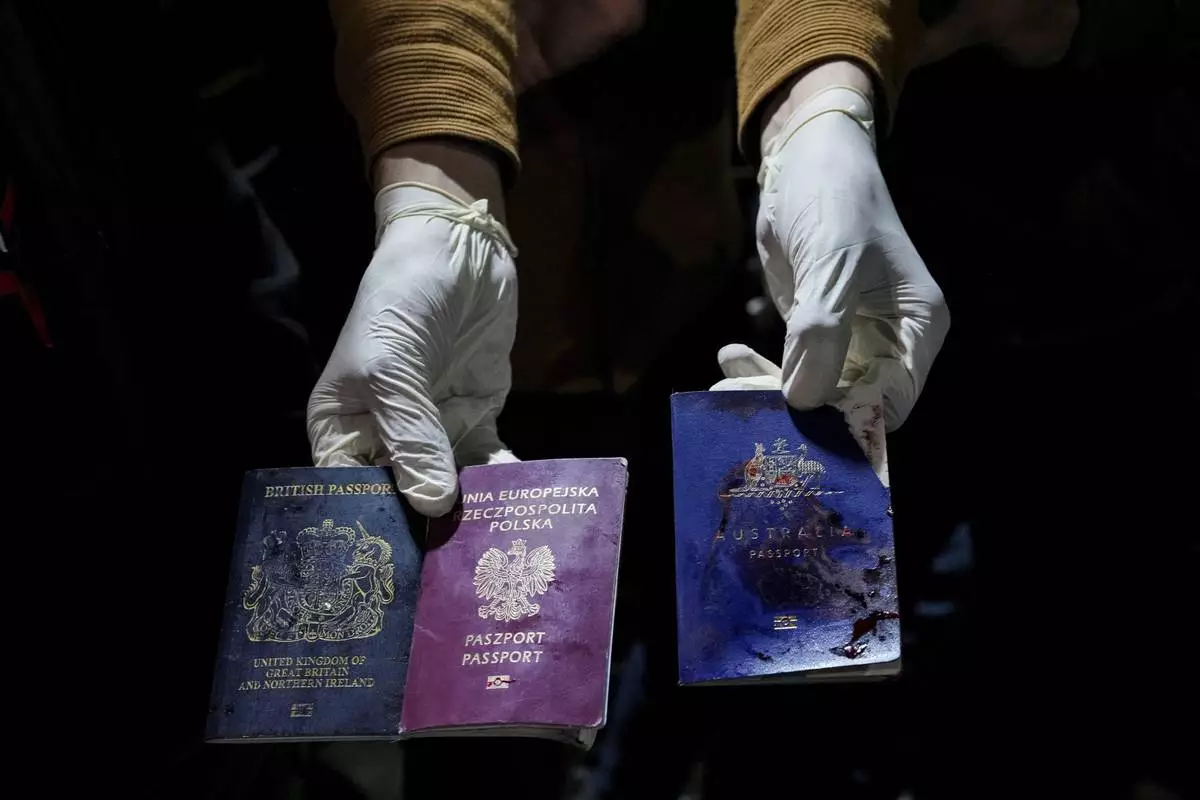
FILE - A man displays blood-stained British, Polish, and Australian passports after an Israeli airstrike, in Deir al-Balah, Gaza Strip, World Central Kitchen and a few other aid groups suspended operations in Gaza, after seven aid workers were killed by airstrikes. Yet despite the danger, many of the largest organizations barely slowed down. Hunger has become commonplace in Gaza amid the war with Israel, and U.N. officials warn that famine is increasingly likely in northern Gaza. (AP Photo/Abdel Kareem Hana, File)
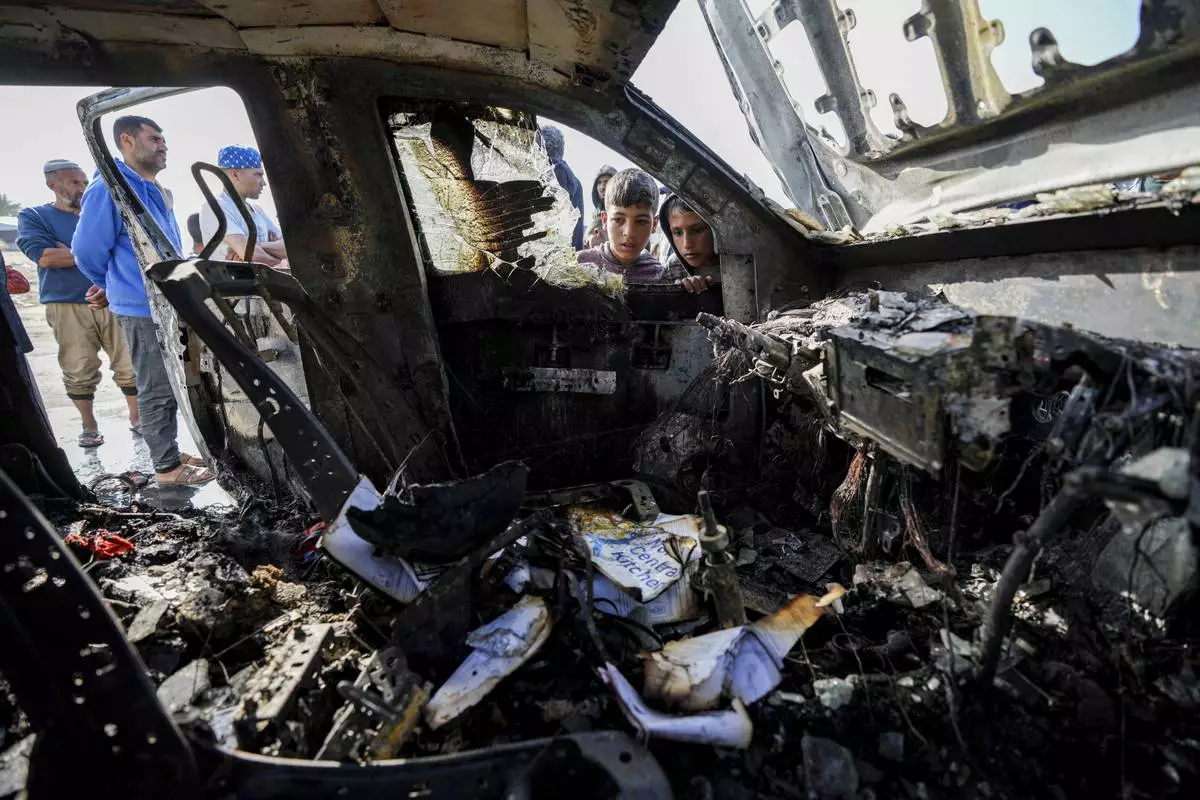
FILE - People inspect the site where World Central Kitchen workers were killed in Deir al-Balah, Gaza Strip, April 2, 2024. World Central Kitchen and a few other aid groups suspended operations in Gaza, after seven aid workers were killed by airstrikes. Yet despite the danger, many of the largest organizations barely slowed down. Hunger has become commonplace in Gaza amid the war with Israel, and U.N. officials warn that famine is increasingly likely in northern Gaza. (AP Photo/Abdel Kareem Hana, File)
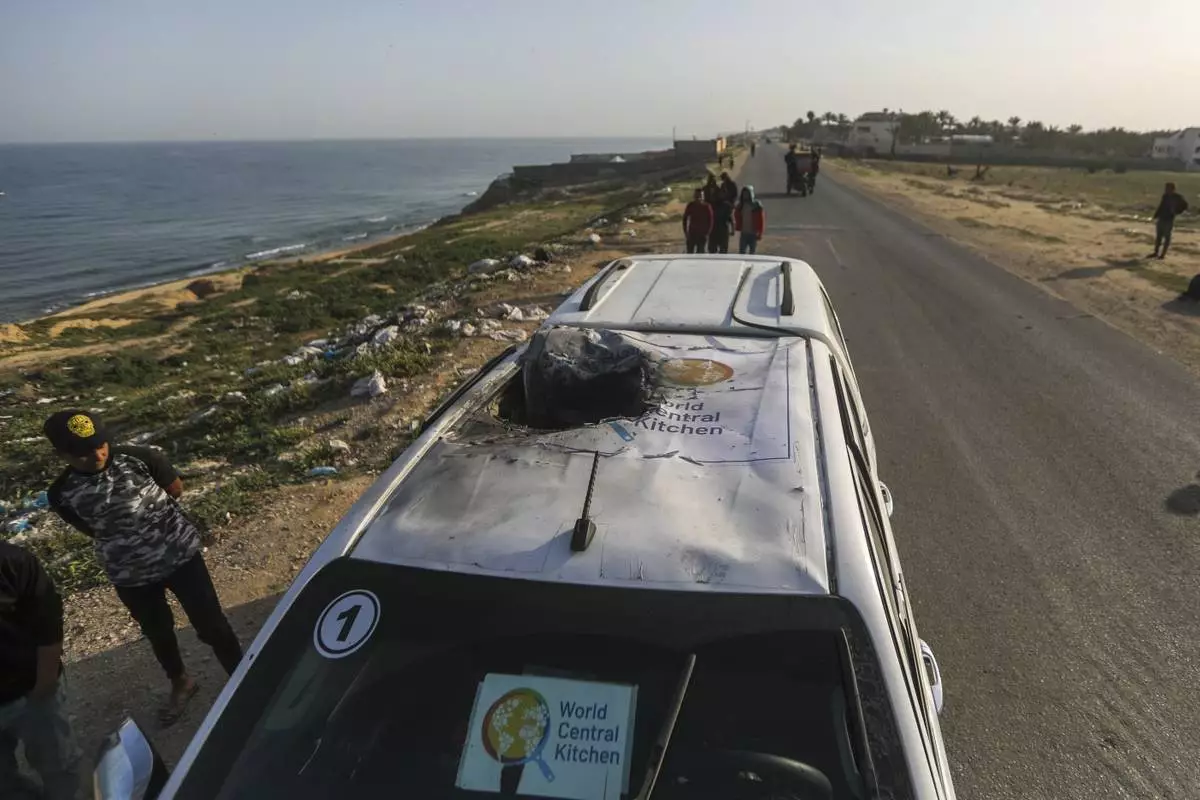
FILE - Palestinians inspect a vehicle with the logo of the World Central Kitchen wrecked by an Israeli airstrike in Deir al Balah, Gaza Strip, Tuesday, April 2, 2024. World Central Kitchen and a few other aid groups suspended operations in Gaza, after seven aid workers were killed by airstrikes. Yet despite the danger, many of the largest organizations barely slowed down. Hunger has become commonplace in Gaza amid the war with Israel, and U.N. officials warn that famine is increasingly likely in northern Gaza. (AP Photo/Ismael Abu Dayyah, File)
NEW YORK (AP) — Jurors in Donald Trump's hush money trial heard for the first time how and why Michael Cohen's reimbursement for payment the Stormy Daniels' payment was entered as a legal expense.
Former Trump Organization controller Jeffrey McConney testified Monday about conversations he had with the company's longtime finance chief Allen Weisselberg in January 2017 about reimbursing Cohen for $130,000 he'd paid to lawyer Keith Davidson, Daniels' then-lawyer.
McConney said handwritten notes from Weisselberg detailed how much to reimburse Cohen for. All expenses had to be entered in the general ledger with a category code, and “we were paying a lawyer,” McConney explained. So it was coded as such.
Prior to witness testimony, Trump was sanctioned a second time for violating a gag order barring him from publicly speaking about witnesses, jurors and others connected to the trial.
Judge Juan M. Merchan fined him $1,000 and warned that going forward, additional violations could result in jail time.
The trial is in its 12th day.
Overall, prosecutors are inching further into those in Trump's orbit, setting the stage for a deeper dive into what they say was a scheme to influence the 2016 presidential election by buying and burying negative stories about the then-candidate.
Cohen is the prosecution's star witness and went to prison for the hush money scheme.
Trump has pleaded not guilty to 34 felony counts of falsifying business records.
The case is the first-ever criminal trial of a former U.S. president and the first of four prosecutions of Trump to reach a jury.
Currently:
— Read the judge's ruling on Trump's most recent gag order violation
— Hush money, catch and kill and more: Terms to know in Trump trial
— What Trump’s gag order means in his hush money case
— Key players: Who’s who at Donald Trump’s hush money criminal trial
— The hush money case is just one of Trump’s legal cases. See the others here
Here's the latest:
Donald Trump's attorneys began cross-examination of Jeffrey McConney on Monday with questions that hit on a key defense theme: that Michael Cohen was a lawyer, and “payments to lawyers are legal expenses.”
McConney agreed that such payments were.
It’s a point the defense wants to make because part of its argument is that there was nothing illegal about the way Cohen was paid for his handling of the $130,000 Stormy Daniels pay.
Underscoring the point, Trump lawyer Emil Bove directed the former Trump Organization controller to the signature under Cohen’s email address, which read: “Personal attorney to President Donald J. Trump.”
“It doesn’t say ‘fixer’ does it?” Bove asked, referencing a title commonly applied to Cohen. “No,” McConney responded.
The email was from February 2017, just after Cohen left the company's full-time payroll. It listed his title as “Personal Attorney to President Donald J. Trump,” with a Gmail address, rather than a Trump Organization email.
Bove posited that by that point, Cohen was “akin to a vendor to President Trump” and was paid accordingly.
While noontime testimony in Donald Trump's criminal trial took a dry turn with Jeffrey McConney authenticating and describing various ledger printouts and tax documents, jurors nevertheless watched the former Trump Organization controller and some appeared to take notes. One juror cradled his chin in his hand.
If not the juiciest testimony heard so far, it’s legally important, allowing the documents to be entered into evidence. They show the source and scope of payments, including that Cohen was paid $315,000 out of Trump’s personal account and $105,000 out of the trust that handled his assets while he was in the White House.
Like Michael Cohen, Allen Weisselberg's has been name checked numerous times during Donald Trump's hush money trial but is otherwise absent from the courtroom.
The former Trump Organization executive, described by a witness Monday as the architect of an arrangement to reimburse Cohen for a hush-money payment, is currently in jail for lying under oath in another Trump-related case.
Weisselberg, 76, was sentenced last month to five months in jail for lying under oath while testifying in New York Attorney General Letitia James’ civil fraud lawsuit against Trump. He is currently serving the sentence at New York City’s notorious Rikers Island jail complex.
It’s his second time behind bars. The ex-chief financial officer served 100 days last year for dodging taxes on $1.7 million in company perks, including a rent-free Manhattan apartment and luxury cars. He was also ordered to pay $1 million as part of Trump’s civil fraud judgment.
Weisselberg’s plea agreement does not require him to testify at the hush money trial, and neither side has indicated it plans to call him as a witness.
Cohen told Congress in 2019 that it was Weisselberg who decided how to structure his reimbursement for the payment to Daniels. Cohen said Weisselberg paid the money out over 12 months “so that it would look like a retainer.”
After paying the first two reimbursement checks to Michael Cohen through a trust, the remainder of the checks — covering payments for April to December 2017 — were paid from Donald Trump’s personal account, Jeffrey McConney testified on Monday.
With Trump, the only signatory to that account, now in the White House, the change in funding source necessitated “a whole new process for us,” McConney added.
“Somehow we’d have to get a package down to the White House, get the president to sign the checks, get the checks returned to us and then get the checks mailed out,” he testified.
Cohen was being reimbursed for making a payment to Keith Davidson for porn actor Stormy Daniels' silence about a sexual encounter with Trump from years prior.
McConney served as the Trump Organization's controller for nearly three decades before retiring last year.
Getting to a key part of Donald Trump's hush money case — how and why Michael Cohen’s reimbursement for the Stormy Daniels payment was entered as a legal expense — former Trump Organization controller Jeffrey McConney testified that he instructed an accounting department employee to do so.
All expenses had to be entered in the general ledger with a category code, and “we were paying a lawyer,” McConney explained on Monday. So in went the code: 51505.
He said he also instructed the employee to record that the first two payments were for a “retainer” for the months of January and February 2017.
“I was just taking information from the invoice” that Cohen had typed into an email, McConney said, though he acknowledged he’d never seen a retainer agreement between Cohen and the company.
A bank statement displayed in court during Donald Trump's criminal trial on Monday showed Michael Cohen paying Keith Davidson, the lawyer for porn actor Stormy Daniels $130,000, on Oct. 27, 2016, out of an account for an entity Cohen created for that purpose.
Weisselberg’s handwritten notes about reimbursing Cohen were stapled to the bank statement in the company’s files, Jeffrey McConney, formerly the Trump Organization's controller, testified.
The notes spell out a plan to pay Cohen a base reimbursement of $180,000 — covering the payment to Davidson and an unrelated technology bill. That total was then doubled or “grossed up” to cover the state, city and federal taxes that Weisselberg estimated Cohen would incur on the payments.
Weisselberg then added a $60,000 bonus, for a total of $420,000, according to the notes.
McConney’s own notes were also shown in court. After calculations that laid out that Cohen would get $35,000 a month for 12 months, McConney wrote: “wire monthly from DJT.”
Asked what that meant, McConney said: “that was out of the president’s personal bank account.”
McConney said he didn’t know of any other time when the company added onto an employee reimbursement to cover the cost of taxes. Employee reimbursements, if characterized as such, are not subject to taxation.
Trump is accused of falsifying business records by labeling the money paid to Cohen in his company’s records as legal fees. Prosecutors contend that by paying him income and giving him extra to account for taxes, the Trump executives were able conceal the reimbursement.
For the first time, jurors on Monday heard about the reimbursements at the root of the charges against Donald Trump in his hush money trial.
Former Trump Organization controller Jeffrey McConney testified about conversations he had with the company’s longtime finance chief Allen Weisselberg in January 2017 about reimbursing Michael Cohen for $130,000 he’d paid to lawyer Keith Davidson.
“Allen Weisselberg said we had to get some money to Michael, we had to reimburse Michael. He tossed a pad toward me and I started taking notes on what he said,” McConney testified. “That’s how I found out about it.”
Cohen, who’d worked for the Trump Organization for about a decade, had just been taken off the payroll as a salaried employee.
As prosecutors in Donald Trump's hush money trial shifted their questions to the subject of Donald Trump's former lawyer Michael Cohen, Jeffrey McConney, like multiple witnesses before him, didn't seem to be a fan.
Asked if he was familiar with the former Trump fixer, McConney paused briefly, before adding: “I’ve had conversations with him by the coffee machine.”
In response to a question about Cohen’s position within the Trump Organization, McConney responded dryly: “He said he was a lawyer.”
In an anecdote from early in his career, former Trump Organization controller Jeffrey McConney testified in court about Donald Trump’s close attention to his cash and hardball approach to bills.
When he went to drop off a report on Trump’s desk one day in the late 1980s, he said, the then-real estate mogul looked up while on the phone and said, “Jeff, you’re fired.”
McConney was taken aback. Then Trump added, according to the ex-controller: “You’re not fired, but my cash balances went down from last week.”
McConney said he explained that various expenses had come up. Trump responded that he should “focus on my bills, negotiate my bills.”
“It was a teaching moment,” McConney recalled. “If someone’s asking for money, negotiate with them,” rather than just paying.
From the defense table, the former president appeared to enjoy hearing the story, lifting his chin and smiling broadly in McConney’s direction.
People watching Donald Trump's hush money trial from the courthouse were joined in the overflow room Monday morning by a group of students from a Manhattan private school, who said they were given the morning off to attend.
“That’s him!” one of the high schoolers yelped earlier in the morning as Trump appeared on the video monitor. She was promptly shushed by one of her classmates.
Former Trump Organization controller Jeffrey McConney took the stand Monday morning in Donald Trump's hush money case.
McConney worked for the company for more than three decades, retiring last year after he was granted immunity in exchange for testifying for the prosecution at the Trump Organization’s New York criminal tax fraud trial. During that trial, he admitted breaking the law to help fellow executives avoid taxes on company-paid perks. The company was convicted and is appealing.
McConney, who left with $500,000 in severance, went on to testify tearfully last fall at the civil fraud trial of Trump, the company and key executives. The ex-controller said he’d been worn out by his entanglement in a litany of Trump-related investigations and legal proceedings.
“I just wanted to relax and stop being accused of misrepresenting assets for the company that I loved working for,” he said at the time.
The judge in Donald Trump's hush money case found on Monday that Donald Trump had violated his gag order with comments he gave to a program called “Just the News No Noise” on April 22, which is broadcast on Real America’s Voice.
On the program, the former president criticized the speed at which the jury was picked and claimed it was stacked with Democrats. “The jury was picked so fast. 95 percent Democrats. The area’s mostly all Democrat,” he is quoted as saying.
In his ruling, Judge Juan M. Merchan said the comments “not only called into question the integrity, and therefore the legitimacy of these proceedings, but again raised the specter of fear for the safety of the jurors and of their loved ones.”
“Defendant is hereby put on notice that if appropriate and warranted, future violations of its lawful orders will be punishable by incarceration,” the judge wrote in the order.
The gag order bars Trump from making comments about the jurors, key witnesses and some others connected to the criminal trial.
The judge presiding over former President Donald Trump’s hush money trial has fined him an additional $1,000 for again violating a gag order barring him from making inflammatory comments about witnesses and jurors.
Judge Juan M. Merchan warned on Monday that additional gag order violations could potentially result in jail time.
“The last thing I want to do is put you in jail. You are the former president of the United States and possibly the next president as well,” Merchan said. “There are many reasons why incarceration is truly a last resort for me. To take that step would be disruptive to these proceedings.”
Trump sat forward in his seat, glowering at the judge as he handed down the ruling. Once the judge finished speaking, Trump shook his head twice and crossed his arms.
Prosecutors had accused Trump of four violations, but the judge only concurred with one.
The judge had previously fined Trump $9,000 for nine earlier violations in posts on Truth Social and his website.
Before heading into the courtroom Monday morning, Donald Trump spoke to reporters, relaying familiar complaints about the fairness of the trial, the judge and the gag order that stops him commenting on witnesses and jurors.
He also noted the breaking news that Columbia University canceled its main commencement following weeks of pro-Palestinian protests.
“That shouldn’t happen,” he said.
Donald Trump has arrived at the courthouse in lower Manhattan as witness testimony in his hush money trial enters its third week.
Witness testimony in Donald Trump's criminal trial is entering its third week on Monday and it remains to be seen who will take the stand next.
Over the past couple weeks, jurors have heard from a host of different people.
Following a weeklong jury selection process that began mid-April, jurors heard first from former National Enquirer publisher David Pecker, who among other things explained his pledge to be the “eyes and ears” of Trump's 2016 presidential campaign.
Keith Davidson, a lawyer who represented porn actor Stormy Daniels and former Playboy model Karen McDougal in hush money negotiations, also took the stand. And jurors heard from others such as a forensic analyst who examined Michael Cohen's phones and a paralegal with the Manhattan district attorney's office.
Former White House press secretary and ex-Trump adviser Hope Hicks on Friday painted a vivid picture of the chaos that unfolded after the “Access Hollywood” tape leaked and the Wall Street Journal ran a story about McDougal's hush money deal.
The defense cross-examined Hicks for roughly 20 minutes before court adjourned early last Friday.
Although an ensemble of different people have testified in Donald Trump's hush money case over the past two weeks, one pivotal witness has been frequently heard but not yet seen: Michael Cohen, Trump's former lawyer and personal fixer.
Jurors last week began hearing Cohen’s words on audio recordings as prosecutors worked to directly tie Trump to payments to silence women with damaging claims about him before the 2016 election.
Jurors heard, in particular, a potentially crucial piece of evidence: a recording of Trump and Cohen, then his attorney, discussing a plan to pay off an ex-Playboy model who claimed to have an affair with Trump. The former president denies the affair.
They also heard a few witnesses recount their interactions with Cohen — some pleasant and others far less so.
It's unclear when the prosecution's star witness will take the stand.
Donald Trump is expected to return to Manhattan court as his hush money trial enters its 12th day.
Last week's proceedings saw a frenzy of witnesses take the stand, including former Trump adviser Hope Hicks and Keith Davidson, a lawyer who represented porn actor Stormy Daniels and former Playboy model Karen McDougal in hush money negotiations with Cohen and the National Enquirer.
The week also saw Trump fined $9,000 by Judge Juan M. Merchan for violating a gag order that bars the former president from speaking publicly about key witnesses, jurors and others in the case. A second contempt hearing was held on Thursday over four more prospective violations, but Merchan did not immediately issue a decision.

Former President Donald Trump speaks to reporters at Manhattan criminal court, Monday, May 6, 2024 in New York. (Brendan McDermid/Pool Photo via AP)

Former President Donald Trump speaks to reporters at Manhattan criminal court, Monday, May 6, 2024 in New York. (Brendan McDermid/Pool Photo via AP)

Former President Donald Trump walks with his attorney Todd Blanche in Manhattan criminal court, Monday, May 6, 2024 in New York. (Brendan McDermid/Pool Photo via AP)

Former President Donald Trump sits in Manhattan criminal court, Monday, May 6, 2024 in New York. (Brendan McDermid/Pool Photo via AP)

Former President Donald Trump sits in Manhattan criminal court, Monday, May 6, 2024 in New York. (Brendan McDermid/Pool Photo via AP)

Former President Donald Trump walks away after talking to reporters outside the Manhattan Criminal Court, Friday, May, 3, 2024, in New York. (Doug Mills/The New York Times via AP, Pool)

Former President Donald Trump returns to his trial at the Manhattan Criminal Court, Friday, May 3, 2024, in New York. (Curtis Means/Pool Photo via AP)

Former President Donald Trump appears at Manhattan criminal court before his trial in New York, Friday,, May 3, 2024.(Charly Triballeau/Pool Photo via AP)

Former President Donald Trump speaks to media as he returns to his trial at the Manhattan Criminal Court, Friday, May 3, 2024, in New York. (Charly Triballeau/Pool Photo via AP)











